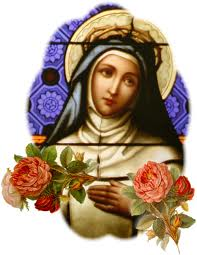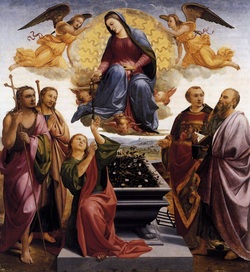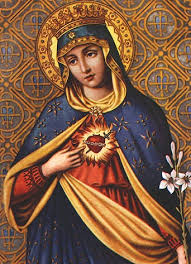 This week we celebrate the Feast Day of Saint Rose of Lima patron saint of our Diocese, and (indirectly) of our community. Some of you may be asking how the city (and later the diocese) came to be named after St Rose. It seems that a young Indian girl was baptized in the Santa Rosa creek on August 30th, the traditional feast day of St Rose of Lima (this feast was later moved to August 23rd on the new calendar). She took the name Rosa at her baptism. This date August 30, 1829 is now seen as the beginning of the city of Santa Rosa. If you walk the path along Santa Rosa Creek there is a special plaque commemorating this event. So now you know how the city got its name. St Rose was born in Lima, Peru April 20th, 1586 and was the first canonized saint of the New World. At birth she was given the name Isabel after her maternal grandmother, but from the time she was a baby was called Rosa or Rosita. Later she was officially given the name Rosa at her Confirmation. Naturally amiable and physically beautiful, Rosa was greatly loved by her family and all who knew her. At home she fulfilled her duties, but also spent much of her time caring for the poor and the sick. She even helped supplement her family’s income by growing and selling flowers and creating and selling exquisite needle work. Despite her many admirers Rose refused to even consider the idea of marriage, since she took a childhood vow of virginity, very seriously. She even scarred her face so that she would not appear attractive to anyone. Instead of focusing her love and care on raising her own family, she directed her efforts to any child she knew needed her. One of Rosa’s greatest desires in life was to become a religious, and she even received an offer to enter the Poor Clare convent. The idea met with so much resistance from her parents that she eventually withdrew from the process. Later she was given another opportunity at the Convent of the Incarnation. This time she stopped to pray at the Church of Santo Domingo with her brother Hernando. She begged that her novitiate might be blessed by God, and she was unable to move. As her brother reminded her that it was already past the hour she was expected at the convent, she replied that she knew this but she could not stand. Her brother tried to help her up, but he was also unsuccessful. Finally she realized that there must be some reason why she should not follow through with her plan. Rose said to Our Lady “Senora, I promise that if it is not your will that I should become a cloistered nun, I will return to the house of my parents. I will continue to serve them, but I will also serve you. Their house shall be my retreat and your sanctuary”. After saying this prayer she was able to stand almost immediately. Soon after this at the age of 20, she became a member of the Third Order Dominicans which had been founded to allow for religious life in the bosom of the family. Although she was not required to wear any kind of religious garb by her way of life, she chose to do so as a sign of her unity with Our Lord. Her's was a life of constant prayer and penance. She constantly sought solitude so that she could be alone with God. St Rose died in Lima August 24th, 1617, and was canonized in 1671. She is the patron of Latin America where her feast is still celebrated on August 30th. As we celebrate her life let us ask St Rose to show us how to love God more deeply and serve him more faithfully. May the light of her example help us to draw ever nearer to Christ, so that our example will lead others to follow him. St Rose of Lima Pray for us! A garden is a teacher. A person who gardens oblivious to the lessons of God's creation misses treasures, but one who gardens with the ears of the soul open to learn will be fed. The garden teaches us the incomprehensible lesson of life and death. "Unless a grain of wheat falls into the ground and dies..." Every year, the garden patienly walks us through this lesson. It is in the present plant dying that next year's crop is possible. Also with man. It is only in dying to self that we can bear fruit abundantly, fruit that will last. As gardener this summer, several lessons were particularly striking to me. First, there is meaning in darkness. "Unless a grain of wheat falls into the ground and dies, it remains alone..." Into. It is not simply to detach from the parent plant, but to disappear into the earth. It is lost in darkness. Alone. Suffocated by the earth. It cannot see the path ahead, nor can eyes above see it, but in that darkness and aloneness it is transformed. What was last seen as a small, insignificant bit of matter now begins again as a small, delicate sprout, growing into "a fruitful vine." From the darkness arises a thing of beauty. Without the darkness and isolation, there can be no harvest. So with the spiritual life. The garden reinforces the lesson of littleness and hiddeness. It is from the tiniest bits of matter, dried and shriveled, lifeless, that the luscious growth of summer springs. God has no need of any one of us to carry out His glorious work. Nonetheless, in His wisdom He invites everyone to have a share in His life. Seeds are tiny and insignificant in themselves, yet they contain within the ability to, cooperating with their design, become beautiful plants. We too are insignificant in ourselves, but through the grace of Baptism, God dwells within us. If we cooperate with His design, He can use us for His greater glory and the salvation of souls. Silence. Everything in the garden happens in silence. Life. Death. Flowering. Bearing fruit. Never does the eggplant stand up and say, "Look at me! See how beautiful and rich my color is - royal!" Nor does the tomato develop a huffy attitude when it's ripe fruit isn't acknowledged and picked immediately. It sprouts, blooms, and ripens in silence. If it is mature and no one picks it, it simply lets go, slips back into the ground, and in that death lays seeds for next year's harvest. "Unless a grain of wheat falls into the ground and dies, it remains alone; but
if it dies it bears much fruit. he who loves his life loses it, and he who hates his life in this world will keep it for eternal life. If any one serves me, he must follow me; and where I am, there shall my servant be also; if any one serves me, the Father will honor him." ~ John 12:24-26  Alleluia, Alleluia. Mary is Taken Up Into Heaven: The Hosts of Angels Rejoice. Alleluia. "The august Mother of God, mysteriously united from all eternity with Jesus Christ in one and the same decree of predestination, immaculate in her conception, a virgin inviolate in her divine motherhood, the whole-hearted companion of the divine Redeemer who won complete victory over sin and its consequences, gained at last the supreme crown of her privileges - to be preserved immune from the corruption of the tomb, and, like her Son, when death had been conquered, to be carried up body and soul to the exalted glory of heaven, there to sit in splendor at the right hand of her Son, the immortal King of the ages." ~Pope Pius XII, from his apostolic constitution Munificentissimus Deus Happy Feast Day! May the prayers of Our Lady always be with you. "Thesdfasfdasfdds"" The month of August is dedicated to the Immaculate Heart of Mary. It is one of several months devoted, in some way, to the Blessed Mother. Since there are a number of months devoted to her, we can infer some importance to this month being particularly for her Immaculate Heart.
The best way to start thinking about this devotion is its end - Jesus Christ. That is the end of all Marian devotion. There is something that makes this devotion special... here we are focusing on the completely pure and unstained heart of the beloved mother of our Savior and the love of that perfect heart. Since Our Lady was conceived without Original Sin and never committed an actual sin in her entire life, her heart was always perfectly conformed to God. She was able to love Jesus with a perfect and complete love. And this is what first attracts us to this devotion - since she loved Jesus fully, completely, and perfectly we desire to honor and imitate this Immaculate Heart. For what better model do we have to love Our Blessed Lord than the heart of His Holy Mother? A discussion on the Immaculate Heart of Mary would not be complete without the mention of Our Lady of Fatima, specifically regarding the devotion of the Five First Saturdays. When Our Lady appeared to the children in Fatima, she requested that people go to Confession and receive Holy Communion on the first Saturday of the month, for five consecutive months; pray at least five decades of the Rosary, and meditate for an additional fifteen minutes on one or more mysteries of the Rosary. She asked that they do all of this with the intention of making reparation to Mary's Immaculate Heart. If one fulfills this request of the Five First Saturdays, Our Lady promised to obtain for us, at the hour of death, all the graces necessary for salvation. We can see that the Immaculate Heart plays a central role in this devotion which springs from the apparitions at Fatima. Later, Our Lord confirmed with Sr. Lucia (one of the visionaries) that this devotion is focused on making reparation to His Mother's Immaculate Heart, particularly for the five kinds of offenses against her Immaculate Heart. These offenses are: blasphemies against her Immaculate Conception, against her perpetual virginity, against her divine and spiritual maternity, blasphemies of those who insult images of Our Lady, and reparation for those who keep children from Mary. One may ask: how can I live out this devotion particularly in this month dedicated to the Immaculate Heart of Mary? If you have not made the Five First Saturdays, you can start (however, since August has already begun, you can start next month). A small yet profound way is to begin your prayers by uniting with her Immaculate Heart. This intention brings you into union with Mary, the Mother of God and our Mother, who knows our needs and the needs of others better than we do. Finally, one can truly strive to imitate this heart which loves Our Lord so much. By imitating the life and virtues of Our Lady, our own hearts will become more oriented to loving God. Immaculate Heart of Mary, pray for us! Fiat ~ Small Beginnings
One should never despise small beginnings. Things take time, and the more precious something is, the more time it will requre to mature. This is true of all aspects of life, but particularly in the spiritual life. Growth in Christ takes time and effort and only comes through struggle. It is tempting to look critically at the small beginnings that we are constantly making, thinking, "Why bother trying again?" G. K. Chesterton said, "If a thing is worth doing, it is worth doing badly." This sentiment is foreign to the American mind, but it rings true in experience. One cannot do well something complicated unless one begins at some point to do it, however shaky the beginning may be. There is beauty in smallness. Consider "The Word became flesh." A tiny beginning, a most unlikely beginning for the redeption of the world. In silence the Redeemer of the world came and only His dear Mother knew of His presence. One quiet Fiat and the Beginning entered time. Without this one 'yes,' the world would remain languishing in darkness, God would continue longing to pour forth His salvific Love. "Fiat." Let it begin! With a beginning, we cannot hope to do great things. So let us begin! Again! ~~~~ First Fruits In Genesis chapter 3, we hear of Cain and Abel offering to God from the fruits of their labor. Although both of them gave back to God, the Lord was pleased with Abel's offerings because he gave of the best he had. The same is true of us when we sacrifice to give the very best to God it will make Him happy because He sees the effort we put in. As religious we are always striving to be our very best for God, this is why our first formal action of the day is to come together and praise God. Doing this sets the tone for the rest of our day and focuses our attention on the most important thing: God. ~~~~ “Lord God be my refuge” – Part of the antiphon from Wednesday Compline This is but one place in which the Lord is called our refuge. As it happens so frequently with Scripture and the Divine Office, something will really jump out at me even though I have seen it many times before. This time, it was the word “refuge”. I always considered these lines of God as my refuge as being very comforting, but never really thought of what it means for God to be my refuge. A refuge is a shelter of protection from danger or distress and it is the physicality of this word that strikes me. A shelter is a place into which you go to hide and be protected. And, thinking of the fact that God is not just someone I talk to in distress (and He is that perfectly!) but is also present in such a way that I can hide IN Him. It may be difficult to conceive how this works, but the same faith that tells me Jesus is present in the Holy Eucharist also tells me that God is able to shelter me. And that is, indeed, very comforting. |
Categories
All
Archives
March 2024
|
Marian Sisters of Santa Rosa



 RSS Feed
RSS Feed
